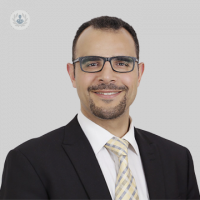Treating macular holes with surgery
Escrito por:In his previous article, leading consultant ophthalmologist Mr Abdallah Ellabban, who sees patients in East Riding of Yorkshire and Hull, explained exactly what macular holes are, how they occur, and much more. Here, he shares his expertise on how they are treated and what to expect from a vitrectomy.

What is the treatment for macular hole?
Vitrectomy is a surgical procedure that treats macular holes. It is the only treatment for the condition; eye drops or stronger glasses are ineffective. Vitrectomy is performed as day surgery under local anaesthetic so, you won’t feel pain, although you may experience some pressure in the area during the procedure. The surgery often takes about 45 minutes and can be combined with cataract surgery if necessary.
During a vitrectomy, the gel inside the eye is removed by using small instruments. The thin, surface layer of the retina, the internal limiting membrane, is also removed with fine micro-forceps. Afterwards, the surgeon will usually put a bubble of gas into the eye to aid in the closing of the macular hole.
Then you will be instructed about a certain posture after the surgery, usually face down for a few days. The face-down posture will help to keep the gas bubble in contact with the healing macular hole. The gas usually disappears in a few weeks.
What will happen after the surgery?
Following the surgery, you will be advised to start the postoperative medication and posturing as instructed. You will be reviewed after the surgery, to assess the healing process of the retina. You will be monitored with the aid of optical coherence tomography (OCT) scans to assess the healing process of the macular hole.
What is the success rate of macular hole surgery?
How successful the surgery is, depends on factors such as the size and duration of the hole, as well as additional retinal conditions. With modern technology, the success of macular hole surgery is about ninety percent. Based on the initial assessment, you will be advised regarding the outcome of the surgery in your situation.
Will my vision recover completely after the surgery?
When the hole closes after the surgery, you will usually regain a large part of the vision. This usually takes a few weeks to months for the hole to heal completely. Also, the central blurring and distortion will gradually improve after surgery, however, it will not be completely restored as normal.
What if I decided not to go for the surgery?
If no surgery is performed, the hole may continue to enlarge with further deterioration in the central vision. Also, if the surgery is delayed, this may affect the final outcome of the surgery. Rarely, in less than five percent of cases, small macular holes may close spontaneously.
Mr Abdallah Ellabban is a highly skilled dual-qualified consultant ophthalmologist, practising in East Riding of Yorkshire and Hull. If you would like to book a consultation with him, you can do so via his Top Doctors profile.


